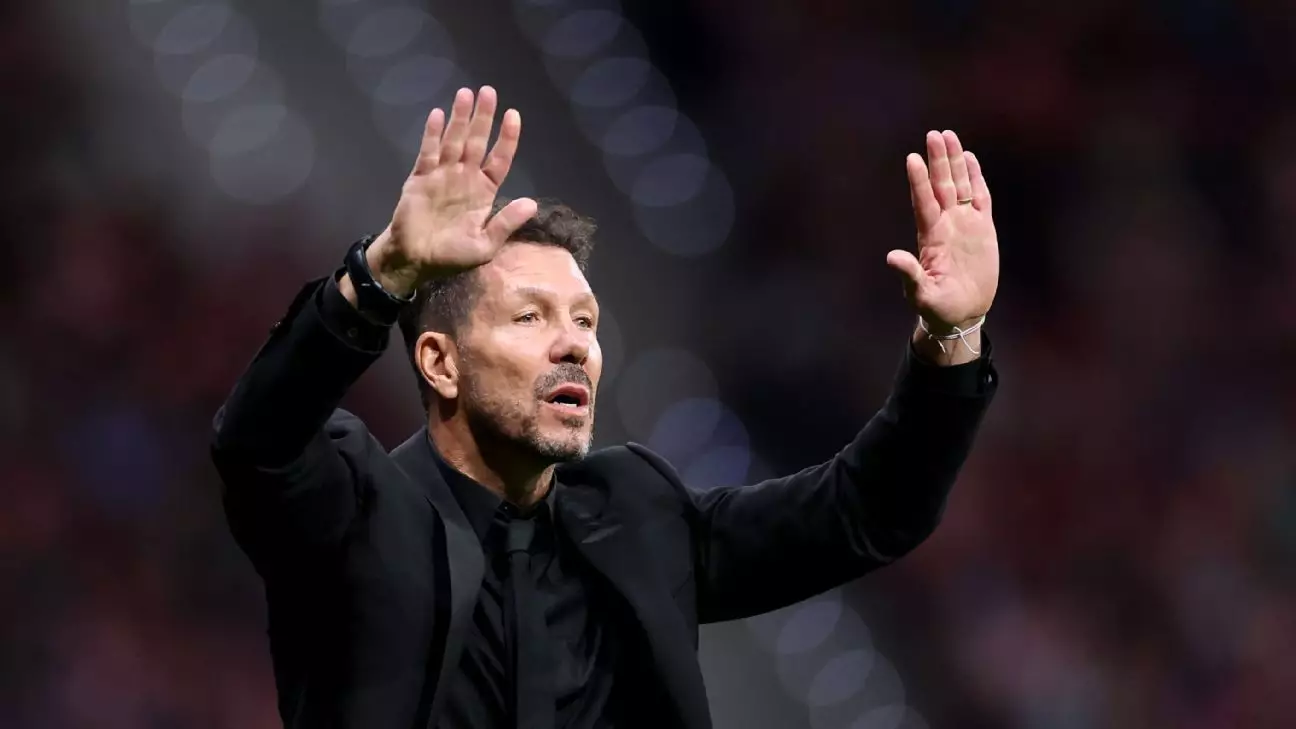The recent Madrid derby between Atlético Madrid and Real Madrid was marked not only by the fierce competition typical of these encounters but also by an unsettling interlude that forced a temporary suspension of the match. As the game teetered on the edge of excitement, with Real Madrid’s Éder Militão scoring the opening goal, an unsavory incident turned the focus from the players on the field to the irate fans in the stands. Object after object, including lighters and plastic bottles, were hurled onto the pitch, resulting in a twenty-minute halt to the game. This act of rebellion from the crowd raised crucial questions regarding the relationship between players and supporters, and the responsibilities each holds in maintaining the integrity and excitement of such high-stakes games.
In the aftermath of the chaos, Atlético’s manager, Diego Simeone, did not hold back in addressing the unruly behaviour of a segment of the fanbase. His criticisms extended beyond the spectators; he highlighted the role that players can unknowingly play in inflaming tensions. In a mixed display of accountability, Simeone emphasized that celebrating goals in a provocative manner can agitate fans, leading to regrettable reactions. “We all have to help,” he articulated, suggesting that both players and fans need to exercise restraint and mutual respect. This raises a pertinent debate about the ethics of player celebrations, particularly in a charged atmosphere like a derby match where emotions run rampant.
Simultaneously, the coach reflected on the actions that could merit anger from the stands, specifically referencing the exuberant celebrations of Real Madrid’s goalkeeper, Thibaut Courtois, after his team scored. The implication that such displays can incite hostility illuminates a complex dynamic in which the feelings of fans are interwoven with player conduct. Simeone’s call for caution resonates deeply: when raw emotions collide, the line between fair play and provocation blurs.
The channeling of passion into a negative outlet—such as throwing objects—has long been a topic of discussion in the football world. Simeone’s remarks reflect a necessary critique of crowd behavior, or, more pointedly, the need for fans to remember that expressions of anger can tarnish the sport and their own team’s reputation. The Atlético coach wisely implored fans to recognize their significant role in fostering a supportive atmosphere at stadiums; gestures like throwing items deter from this ideal.
His statements were echoed in a post-match release from Atlético Madrid, which revealed that club officials are mobilizing to identify those responsible for the chaos. They made it clear that such behavior is antithetical to the spirit of the game, and their desire to maintain a positive image reflects a commitment to safeguarding the integrity of the sport. While many fans showcased exemplary conduct during the derby, a minority’s actions left a taint on an event that ordinarily brings people together in celebration of football.
The response from the refereeing crew, led by Mateo Busquets Ferrer, was widely accepted as appropriate, illustrating an adherence to player safety and the need for order in such a volatile environment. Real Madrid head coach Carlo Ancelotti praised the pause in play, acknowledging the discomfort inherent in halting a match but recognizing the necessity of such a decision in ensuring the well-being of all involved.
Developing this discussion, it can also be noted that this incident dovetailed with ongoing issues surrounding racism within Spanish football. Just prior to the derby, LaLiga announced intentions to address a troubling social media campaign encouraging fans to exercise anonymity while engaging in racist behavior. This duality of frustration—expressed through both tangible acts of violence and more insidious forms of discrimination—marks a crucial point for football authorities, teams, and fans alike. There’s a collective responsibility to uphold sportsmanship and civil behavior, both on and off the pitch.
A Call to Action
In consolidating these incidents as part of a broader narrative, it becomes necessary for the football community to engage in self-reflection. While the adrenaline of rivalry can ignite passion and enthusiasm, it’s crucial that this passion does not manifest in harmful behaviors. Educational initiatives focusing on sportsmanship and respect within this vibrant community can contribute significantly to curbing future incidents.
Ultimately, the Madrid derby showcased the essence of football—intensity, passion, and fervor—but it also underscored the pressing need for change. As we look forward to future matches, the lessons learned from this experience must guide us in ensuring that stadiums remain safe havens of enjoyment, respect, and unity among fans and players alike.
